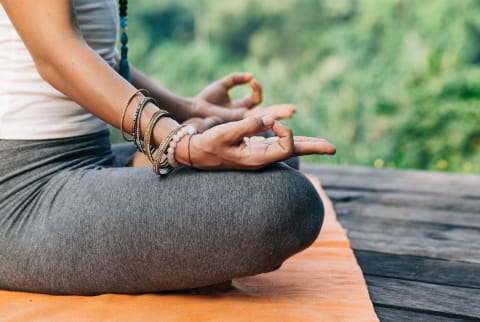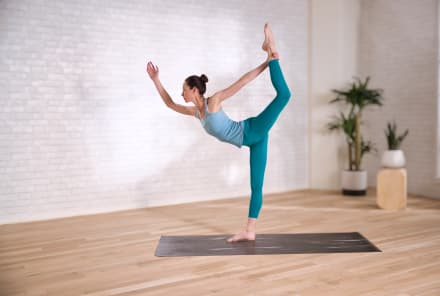Advertisement
7 Ways to Be More Present in 2020 — Even If You Have No Clue How to Meditate

The new year is prime time for making promises to yourself—to hit the gym more, to eat healthier, to stop checking your email in bed. But for all the hyper-specific resolutions we all make, there’s one uber goal that could actually provide a head start to achieve all those smaller ones: to be more mindful.
When you’re solidly in the present moment, you can give 100 percent of your energy to whatever mission deserves your attention. But much as we know we should do it, the idea of “practicing mindfulness” can seem a little vague and intimidating (Is there chanting involved? Do you need candles and singing bowls?). Truth is, you actually don’t need anything, just a bit of honest effort. The following seven simple habits may help you hone in on the present, too, so you can feel healthier and happier all year long.
1. Cut down your social media use.
Despite their name, social platforms actually make us feel more isolated, according to research published in the American Journal of Preventive Medicine. And people who constantly check their email, texts, and social media accounts report being more stressed than those who don’t, a survey conducted by the American Psychological Association found. No need to swear off social--just try cutting your usage down to 10 minutes per platform per day, which a study published in the Journal of Social and Clinical Psychology found to lessen feelings of loneliness, depression, and anxiety. You’ll stay present in the real world instead of the one behind a screen.

2. Track your fitness stats.
It’s common knowledge that working out reduces stress (exercise gives you endorphins, and endorphins make you happy!). And keeping a close eye on your activity data with a fitness smartwatch like the Garmin Venu can have serious positive long-term effects. When researchers followed up with people who had used trackers over a four-year period, they found those people had increased their weekly exercise by 30 minutes, according to the findings published in PLOS Medicine. With easy-to-follow animated workouts, music, and an incredible range of all-day health- and fitness-tracking features, the Garmin Venu is a powerful tool for living more actively. Bonus: The battery lasts up to five days without a charge.
3. Put your phone away when you’re with other humans.
When you’re tapping and swiping in front of someone else, you’re basically telling them they—and the moment you’re sharing—aren’t important to you. Even the sight of your phone during face-to-face interactions can negatively impact closeness, trust, and empathy, a study from the Journal of Social and Personal Relationships found. When you’re out to dinner or grabbing coffee with a friend, keep your phone stashed out-of-sight (and on silent) in a pocket or bag, so both of you can stay in the moment.

4. Make meditating a daily habit.
At this point, everyone knows the benefits of mindful meditation. One comprehensive scientific review found evidence that practicing meditation can help ease psychological stresses like anxiety, depression, and pain. While it may seem counterintuitive, tech can actually make embracing a meditation practice less intimidating: The Garmin Venu, for instance, recognizes when you’re stressed and guides you through mindful breathing exercises.
5. Start a gratitude journal.
Practicing gratitude has a huge effect on your wellbeing, according to a wealth of research. And people who journal about what things they’re grateful for (instead of venting about negative or neutral events) consistently report being in better moods, a study published in the Journal of Personality and Social Psychology found. Jot down three things you’re grateful for at the end of every day. Soon, you’ll find yourself looking for them. How’s that for retraining your brain?

6. Take a lunch break.
When was the last time you actually left the office for lunch? Give yourself permission to step away from your computer and into the great outdoors and you’ll be better off for it. Just walking—without a destination, without a fitness purpose—is enough to boost your mood and override emotions like boredom and dread, a study published in the journal Emotion found. Bonus points if you can find a park, where natural sounds (unlike the incessant ping of incoming Slack messages from your coworker’s computer) can chill you out, according to research published in the journal Nature. No green space? Crank some mellow Amazon Music playlists on your Venu.
7. Ditch your worries.
Like, literally, just throw them out. When participants in an experiment published in the journal Psychological Science wrote down their thoughts and then threw out that piece of paper, they also mentally discarded them—meaning, they used them less in forming judgments than the participants who kept a physical representation of their thoughts did. The researchers also found that it wasn’t enough to imagine trashing your worries, it was the physical action of throwing out the paper that really drove the practice home.












